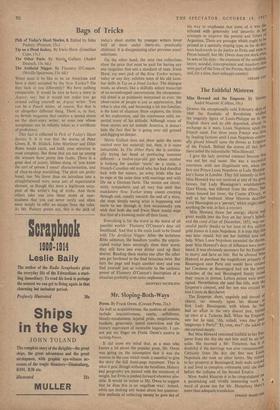Bags of Tricks
The Artificial Nigger. By Flannery O'Connor. (Neville Spearman, 13s. 6d.)
WHAT MIMI it be like to be an American and have a story accepted by the New Yorker? Do they look at you differently? We have nothing comparable. It would be nice to have a story in Argosy, say; but it would not make you go around calling yourself an Argosy writer. You can be a Punch writer, of course. But that is an altogether different thing. There is, in fact, no British magazine that confers a special status on the short-story writer, or even one whose acceptance can be reliably taken as a certificate of proficiency.
This fact is reflected in Pick of Today's Short Stories, 8. It is true that the stories of Peter Green, E. W. Hi!dick, John Mortimer and Dilys Rowe would catch, and hold, your attention in most company. But those that are not up among the winners have pretty low faults. There is a great deal of jaunty, lifeless slang, of 'you know the sort of person I mean' characterisation, and of chap-to-chap moralising. The plots are pretty banal, too. No fewer than six introduce into a straightforward story some sort of supernatural element, as though this were a legitimate occu- pant of the writer's bag of tricks. And three others take you into those states of near- madness that you can never verify and often seem simply to offer an escape from the rules. As Mr. Pudney points out, this is the pick of
today's short stories by younger writers (over half of them under thirty-six, practically children). It is disappointing after previous years' selections.
On the other hand, the next two collections show the price that must be paid for having any one magazine that sets a standard of taste. Irwin Shaw, my own pick of the New Yorker writers, today or any day, exhibits most of his old fami- liar skills in Tip on a Dead Jockey. The dialogue reads, as always, like a skilfully edited transcript of an eavesdropped conversation; the circumstan- tial detail is as painlessly interposed as ever; the observation of people is just as appreciative. But what is also old, and becoming a bit too familiar, is the kind of situation Shaw explores, the limits of his exploration, and the continuous mild, im- partial irony of his attitude. Although many of these stories are set outside America, it doesn't hide the fact that he is going over old ground and digging no deeper.
Mavis Gallant does not show quite the same control over her material; but, then, it is more intractable. In The Other Paris she is continu- ally trying her hand at portraying someone different : a twelve-year-old girl whose mother is looking for another 'uncle' on a cruise, a French-Canadian old maid whp has had dreadful luck with her suitors, an army bride who has to cope at the same time with marriage and with life on a German farm. The stories are clever, witty, sympathetic and all very fine until that mandatory New Yorker irony comes creeping through and, usually towards the end of a story, she stops simply seeing what is happening and starts to see through it. Just occasionally you wish that both she and Irwin Shaw would wipe that hint of a knowing smile off their faces.
Everything is for the worst in the worst of all possible worlds : Flannery O'Connor's dear old Southland. And that is the main fault to be found' with The Artificial Nigger. After the lecherous Bible salesman, the hoodlum youths., the unprin- cipled tramp have seemingly done their worst, they still have one even dirtier card up their sleeves. Reading these stories one after the other you get hardened to the final ferocious twist. But turn the page and begin another story and you find yourself just as vulnerable to the sardonic power of Flannery O'Connor's description of a situation probably even more unpleasant.
GEOFFREY NICHOLSON


































 Previous page
Previous page